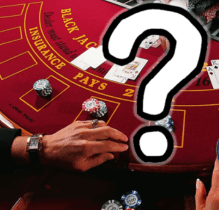What is the probability of winning in the casino?

So, you decided to start playing at the online casino. Before the game it will be useful to know how to win in gambling and what odds are. Consider the processes occurring in gambling, from the point of view of probability theory, and try to determine whether casino games obey mathematic rules.
Throwing a coin, it can be argued that any of its sides can fall out with the same probability. There are only two possibilities - either a head or tails will fall. The probability of a coin toss is 50%, that is, we can expect that tails will fall out in half of the cases. Often speaking of probability, people use the word - chance. The chance that when the coin is thrown, it will fall as heads or tails, equal to 50%.
Probability shows how often the expected result can be achieved and can be represented as the ratio of expected outcomes to the total number of all possible outcomes over a sufficiently long period of time with many repetitions.
Mathematical expectation when playing roulette
Calculate the expected value when playing roulette (in this case the American version with two “zero” sectors) at the rate of $5 per color (for example black): 18 \ 38 x (+ 5 $) + 20 \ 38 x (-5 $) = -0,263 As you have probably noticed, in both examples given, the value of the expectation has a “-” sign, which is typical of most casino bets. Negative expectation in practice means that the longer the game lasts, the greater the likelihood of loss for the player. The casino override (House Edge) (share of the institution) is the opposite of the player’s mathematical expectation and shows what percentage of the bets made during the game for a certain period is retained in favor of the casino.
The casino’s edge in European roulette is 1 - 36/37 = 2.7%, in American roulette its 1 - 36/38 = 5.26% (at the expense of two zeros). This means that if you, playing roulette, for a certain time, with a bet of a total of $1,000, then it is likely that in the end, around $27 (European roulette) and $ 54 (American roulette) will go to the gambling institution. In table games, the casino has less overhang (Baccarat, BlackJack or Craps), so the chances of winning them are higher for the player.
Now let's calculate what are our chances in a casino when playing American Roulette, which has two zeros. Suppose we put on a number (any of them). Payment of winnings, in this case is made in the ratio of 1 to 36. The probability of winning in this case is 1 \ 38 or 2.63%.
- Possible player's win (in percentage to the bet): 1/38 x 36x100 = 94.74%
- Casino percentage: 100 - 94.7 = 5.26%
- Mathematical expectation: [(1 \ 38) х 36 (+1)] + [(37 \ 38) x (-1)] = -0.0263
That is, with each dollar you bet, the gambling house hopes to earn 2.63 cents. In other words, the mathematical expectation of winning of a player when playing American roulette at a casino is -2.6% of each of your bets.
Conclusion
No need to be a mathematician to play in a casino. It is not necessary to even consider the mathematical expectation. The main thing to understand is that games with a higher expected value are more profitable for the player, as they have less casino advantage and, accordingly, the time of your game and the possible amount of winnings will increase. Look for games in which the player’s advantage is realized, only in this case you can count on winning in a long run. When choosing a roulette, give preference to the European version (with one “zero”), as the casino will have an advantage of 2.7%, in contrast to the American version (with two “zeros”), in which the gambling institution has a gain of 5.26%.
But, arguing about the positive and negative expectations, you should not forget that there is a variance. And the higher it is, the more you will be “in a fever” in the game. Remember that all casino gambling math works correctly only when the number of attempts is large and, therefore, it is quite difficult to achieve in practice the estimated expected values due to the player’s limited budget, bets or game time/type.